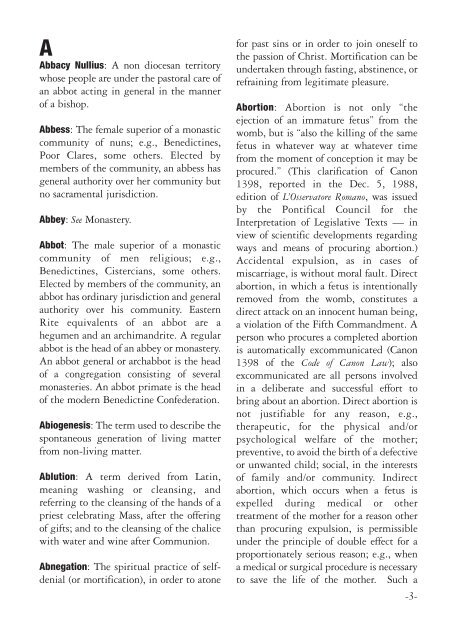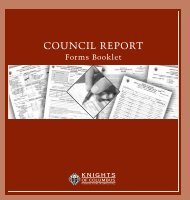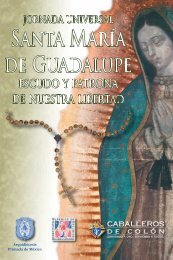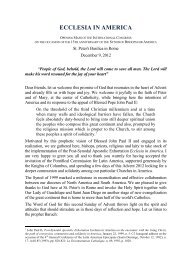CATHOLIC WORD BOOK - Knights of Columbus, Supreme Council
CATHOLIC WORD BOOK - Knights of Columbus, Supreme Council
CATHOLIC WORD BOOK - Knights of Columbus, Supreme Council
Create successful ePaper yourself
Turn your PDF publications into a flip-book with our unique Google optimized e-Paper software.
A<br />
Abbacy Nullius: A non diocesan territory<br />
whose people are under the pastoral care <strong>of</strong><br />
an abbot acting in general in the manner<br />
<strong>of</strong> a bishop.<br />
Abbess: The female superior <strong>of</strong> a monastic<br />
community <strong>of</strong> nuns; e.g., Benedictines,<br />
Poor Clares, some others. Elected by<br />
members <strong>of</strong> the community, an abbess has<br />
general authority over her community but<br />
no sacramental jurisdiction.<br />
Abbey: See Monastery.<br />
Abbot: The male superior <strong>of</strong> a monastic<br />
community <strong>of</strong> men religious; e.g.,<br />
Benedictines, Cistercians, some others.<br />
Elected by members <strong>of</strong> the community, an<br />
abbot has ordinary jurisdiction and general<br />
authority over his community. Eastern<br />
Rite equivalents <strong>of</strong> an abbot are a<br />
hegumen and an archimandrite. A regular<br />
abbot is the head <strong>of</strong> an abbey or monastery.<br />
An abbot general or archabbot is the head<br />
<strong>of</strong> a congregation consisting <strong>of</strong> several<br />
monasteries. An abbot primate is the head<br />
<strong>of</strong> the modern Benedictine Confederation.<br />
Abiogenesis: The term used to describe the<br />
spontaneous generation <strong>of</strong> living matter<br />
from non-living matter.<br />
Ablution: A term derived from Latin,<br />
meaning washing or cleansing, and<br />
referring to the cleansing <strong>of</strong> the hands <strong>of</strong> a<br />
priest celebrating Mass, after the <strong>of</strong>fering<br />
<strong>of</strong> gifts; and to the cleansing <strong>of</strong> the chalice<br />
with water and wine after Communion.<br />
Abnegation: The spiritual practice <strong>of</strong> selfdenial<br />
(or mortification), in order to atone<br />
for past sins or in order to join oneself to<br />
the passion <strong>of</strong> Christ. Mortification can be<br />
undertaken through fasting, abstinence, or<br />
refraining from legitimate pleasure.<br />
Abortion: Abortion is not only “the<br />
ejection <strong>of</strong> an immature fetus” from the<br />
womb, but is “also the killing <strong>of</strong> the same<br />
fetus in whatever way at whatever time<br />
from the moment <strong>of</strong> conception it may be<br />
procured.” (This clarification <strong>of</strong> Canon<br />
1398, reported in the Dec. 5, 1988,<br />
edition <strong>of</strong> L’Osservatore Romano, was issued<br />
by the Pontifical <strong>Council</strong> for the<br />
Interpretation <strong>of</strong> Legislative Texts — in<br />
view <strong>of</strong> scientific developments regarding<br />
ways and means <strong>of</strong> procuring abortion.)<br />
Accidental expulsion, as in cases <strong>of</strong><br />
miscarriage, is without moral fault. Direct<br />
abortion, in which a fetus is intentionally<br />
removed from the womb, constitutes a<br />
direct attack on an innocent human being,<br />
a violation <strong>of</strong> the Fifth Commandment. A<br />
person who procures a completed abortion<br />
is automatically excommunicated (Canon<br />
1398 <strong>of</strong> the Code <strong>of</strong> Canon Law); also<br />
excommunicated are all persons involved<br />
in a deliberate and successful effort to<br />
bring about an abortion. Direct abortion is<br />
not justifiable for any reason, e.g.,<br />
therapeutic, for the physical and/or<br />
psychological welfare <strong>of</strong> the mother;<br />
preventive, to avoid the birth <strong>of</strong> a defective<br />
or unwanted child; social, in the interests<br />
<strong>of</strong> family and/or community. Indirect<br />
abortion, which occurs when a fetus is<br />
expelled during medical or other<br />
treatment <strong>of</strong> the mother for a reason other<br />
than procuring expulsion, is permissible<br />
under the principle <strong>of</strong> double effect for a<br />
proportionately serious reason; e.g., when<br />
a medical or surgical procedure is necessary<br />
to save the life <strong>of</strong> the mother. Such a<br />
-3-

















